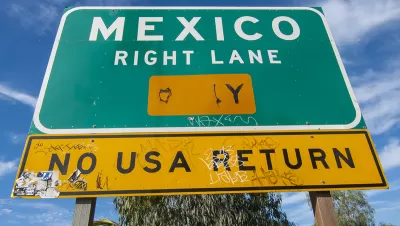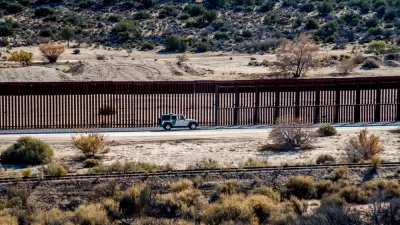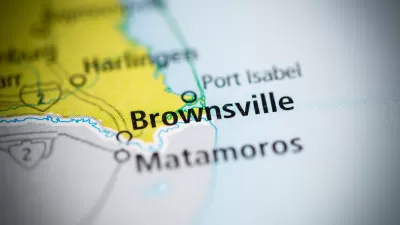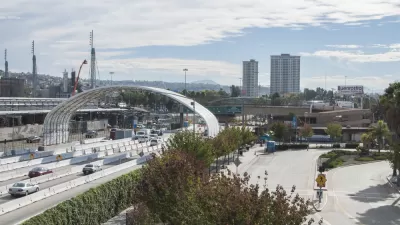Election rhetoric aside, towns on the U.S.-Mexico border share common urban challenges. A proposal is in the works to connect Brownsville, Texas and the Mexican city of Matamoros via bike path.

In the current political climate, taking a casual bike trip across the U.S.-Mexico border seems like an impossibility. But to many border communities, nationalist rhetoric takes a back seat to shared local issues. On one such situation, Ana Arana writes, "Considered as one metropolitan area, Brownsville, Matamoros and the suburbs of both cities comprise more than 1.1 million people."
Bridging the dividing line between Texas and the Mexican state of Tamaulipas, many officials from both sides consider the region a "conurbated metropolis": "an urban region made up of many cities and towns where jurisdictional boundaries can complicate decision making." Shared considerations include pollution, traffic, crime, and public health, none of which can be halted at a porous border. The two cities also share intimate economic ties.
Across a border stereotyped as a place for illegality, city officials like Matamoros Planning Director Mauricio Ibarra want to connect the two communities in an innovative way: a bi-national park and bike trail. He's positioning the proposal as a path toward connecting the two cities' cultural districts.
While security will still be a concern (the park may be sited close to a new U.S. consulate complex, which provides enhanced security), "Ibarra says his park will be a way to reacquaint Brownsville with Matamoros. After all, he says, both cities have gone through difficult times together over many decades and they have always pulled through."
FULL STORY: A Plan for a Bike Trail Across the U.S.-Mexico Border

Planetizen Federal Action Tracker
A weekly monitor of how Trump’s orders and actions are impacting planners and planning in America.

Maui's Vacation Rental Debate Turns Ugly
Verbal attacks, misinformation campaigns and fistfights plague a high-stakes debate to convert thousands of vacation rentals into long-term housing.

Restaurant Patios Were a Pandemic Win — Why Were They so Hard to Keep?
Social distancing requirements and changes in travel patterns prompted cities to pilot new uses for street and sidewalk space. Then it got complicated.

Charlottesville Temporarily Has No Zoning Code
A judge ordered the Virginia city to throw out its newly revised zoning code, leaving permitting for new development in legal limbo.

In California Battle of Housing vs. Environment, Housing Just Won
A new state law significantly limits the power of CEQA, an environmental review law that served as a powerful tool for blocking new development.

Boulder Eliminates Parking Minimums Citywide
Officials estimate the cost of building a single underground parking space at up to $100,000.
Urban Design for Planners 1: Software Tools
This six-course series explores essential urban design concepts using open source software and equips planners with the tools they need to participate fully in the urban design process.
Planning for Universal Design
Learn the tools for implementing Universal Design in planning regulations.
Heyer Gruel & Associates PA
JM Goldson LLC
Custer County Colorado
City of Camden Redevelopment Agency
City of Astoria
Transportation Research & Education Center (TREC) at Portland State University
Jefferson Parish Government
Camden Redevelopment Agency
City of Claremont





























